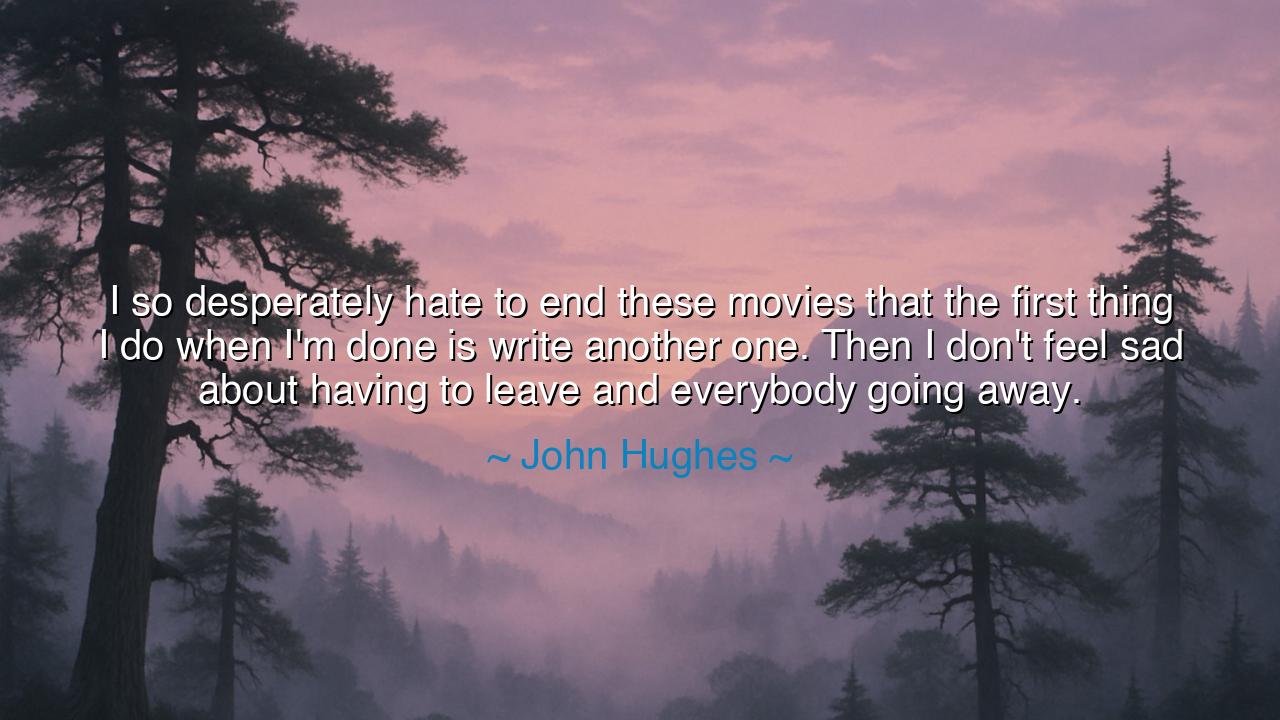
I so desperately hate to end these movies that the first thing I
I so desperately hate to end these movies that the first thing I do when I'm done is write another one. Then I don't feel sad about having to leave and everybody going away.






When John Hughes said, “I so desperately hate to end these movies that the first thing I do when I'm done is write another one. Then I don't feel sad about having to leave and everybody going away,” he spoke with the tender wisdom of one who understands the impermanence of human connection and the power of creation. Hughes, the celebrated filmmaker behind such iconic works as Ferris Bueller’s Day Off and The Breakfast Club, reveals the delicate interplay between art, attachment, and loss. His reflection is not merely about movies; it is about the human heart’s desire to cling to experience, to prolong joy, and to create continuity where endings are inevitable.
The ancients, too, recognized this tension. Virgil, in The Aeneid, mourned the fleeting nature of life and the impermanence of companionship even as he chronicled the hero’s journey. Plato taught that beauty and pleasure are transient, and that one must seek the eternal through the acts of the mind and spirit. Hughes’ method — immediately beginning a new story — mirrors this wisdom: creation itself becomes a salve for the sorrow of endings, a way to honor what has passed while sustaining the vitality of life through new beginnings.
In his reflection, Hughes also acknowledges the grief inherent in endings. Film sets, like all shared human endeavors, create temporary families — communities of collaboration, laughter, struggle, and triumph. The completion of a movie is therefore a kind of exile: the departure of people with whom one has shared intense emotional and creative labor. Hughes’ response — writing another film — is an example of transforming sorrow into action, a practice found throughout history: humans cope with loss by channeling energy into new pursuits that both honor and transcend what has ended.
Consider the example of Beethoven, who, despite the isolation imposed by deafness, poured his grief into composition. Each symphony was both a farewell to previous struggles and a bridge to future expression. Hughes’ approach is similar: the act of writing a new screenplay is not denial of the sadness, but a recognition that creation can preserve the joy of connection, even when the actors and collaborators have departed. In this way, art becomes both memory and renewal, a living thread that binds past and future.
Hughes’ reflection also speaks to the human desire for continuity. Life is filled with fleeting moments: friendships, opportunities, loves, and achievements pass swiftly. By turning to a new project immediately, Hughes demonstrates an active engagement with life, refusing to linger solely in nostalgia or regret. The wisdom of the ancients recognized that to honor the past while investing in the future is to live fully: memory informs action, and grief catalyzes creativity.
History offers further parallels. The painter Michelangelo, upon finishing one monumental work, often turned immediately to another, driven by the need to continue shaping beauty in the world. In doing so, he transformed the sorrow of completion into the excitement of potential, leaving behind a legacy not of mourning, but of continuous creation. Hughes embodies this principle in cinema, reminding us that endings, though painful, can become the seeds of new beginnings if met with courage and imagination.
The lesson is therefore enduring: when faced with the sadness of endings, do not retreat into despair. Instead, channel your energy into creation, growth, or exploration. Embrace the rhythm of life — moments of connection, moments of departure — and respond with action that sustains meaning. Hughes’ approach teaches that grief need not paralyze; it can be transformed into enduring work, joy, and purpose.
So, O listener, carry Hughes’ wisdom into your own life: honor your attachments, feel the sorrow of farewells, and then, like the artist, begin again. Let endings inspire beginnings, and let the act of creation become both comfort and renewal. In this way, life’s impermanence is softened by the permanence of expression, and each conclusion becomes the threshold to new adventure, connection, and the unending dance of human endeavor.






AAdministratorAdministrator
Welcome, honored guests. Please leave a comment, we will respond soon